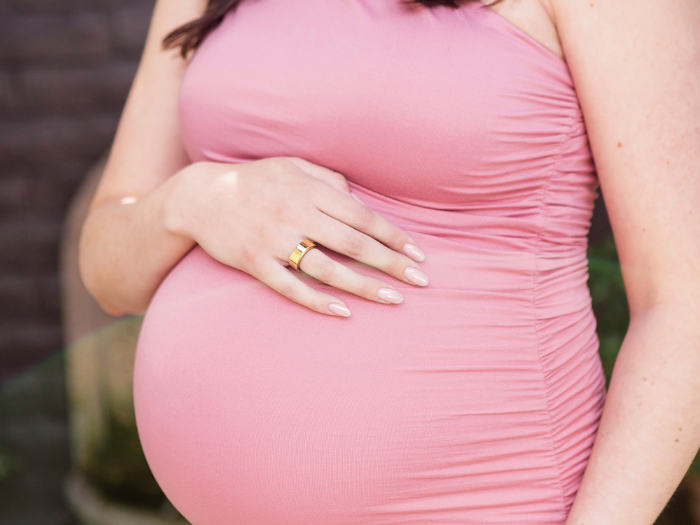Pregnant and can’t sleep? You’re not alone. Up to 80% of women report trouble sleeping during pregnancy. While it may not be easy, it is possible to sleep better during pregnancy by switching up a few of your habits, improving your sleeping environment, and even changing your sleeping position.
Below, discover the best expert-approved tips to improve your sleep throughout each trimester, plus commonly asked questions about sleep during pregnancy.
| Member Tip: When you opt into Oura’s Pregnancy Insights feature, you’ll get personalized information about your pregnancy and support every step of the way. |
Why Sleep Matters During Pregnancy
“When your pregnancy symptoms prevent you from being as productive as usual, it can be disheartening,” says Christine Noa Sterling, MD, a board-certified OBGYN. “But in pregnancy, sometimes the most productive thing you can do in a day is rest.”
Sleep plays a crucial role during pregnancy, influencing both maternal well-being and fetal development. “Your body is working harder than ever, so sleep becomes more important than ever too,” says Dr. Sterling.
The physiological demands of pregnancy on your body, such as increased metabolic rate and blood volume, heighten fatigue. Sleep helps to regulate hormones, including those critical for maintaining a healthy pregnancy, human chorionic gonadotropin (hCG) and progesterone.
Sleep also lowers the risk of developing complications. “Sleep deprivation during pregnancy increases your risk of developing elevated blood pressure, gestational diabetes, postpartum depression and anxiety, and lowers the likelihood of a vaginal delivery,” says Dr. Sterling. Getting enough rest throughout pregnancy is essential for you and your baby.
READ MORE: What Happens to Your Body During Pregnancy, According to Oura Member Data
How to Get Better Sleep in Each Trimester
First Trimester
Your baby is growing by the day, and your body is quickly adapting to support this process. That means drastic physiological and hormonal changes that can impact your sleep, mood, and energy levels.
- Nap when you can: If you are able to, start taking naps during the day when you start to feel the progesterone-induced tiredness hit. “Even as short as a 15-minute nap per day can help improve well-being,” says Neta Gotlieb, PhD, Women’s Health Product Manager at Oura. “Habitual nappers report lower stress levels and lower anxiety.”
- Maximize your time in bed: Try to go to bed earlier to account for being awake more often during the night. “When sleeping efficiency declines, it’s helpful to plan for more time in bed,” says Dr. Gotlieb. “This makes you better able to still hit your recommended sleep goal.”
| Member Tip: Under your Sleep Score, take a look at the Sleep Efficiency contributor, which shows how much time you spent asleep while in bed. |
 Stay hydrated: Dehydration can result if you’ve been experiencing nausea and vomiting, combined with the fact that your body is producing more blood to support a growing fetus. Drink water throughout the day, and try supplementing with electrolytes if you are vomiting frequently. Dehydration can also lead to poor sleep quality.
Stay hydrated: Dehydration can result if you’ve been experiencing nausea and vomiting, combined with the fact that your body is producing more blood to support a growing fetus. Drink water throughout the day, and try supplementing with electrolytes if you are vomiting frequently. Dehydration can also lead to poor sleep quality.- Sip fluids at night: If you’re thirsty at night, try to sip fluids, rather than gulping them. The speed at which you drink may impact your need to urinate.
- Eat smaller meals and snacks: Eating small meals regularly instead of three large ones can help reduce nausea, heartburn, and upset stomach. Dr. Gotlieb adds, “A small snack before bed can also help reduce sleep-disturbing nausea.”
- Try nausea-fighting vitamins: “If your pregnancy nausea is impacting your sleep, you can try taking a sleep-aid at night.* Also consider adding vitamin B6 and ginger into your daily routine, which can help to keep nausea at bay,” says Dr. Sterling.
*Always consult with your doctor before starting a new supplement.
Second Trimester
Many women may experience more energy, with less pregnancy nausea and a cute bump to match. However, your sleep may still be affected, so keep these tips in mind.
- Exercise during the day: If you feel energized during the second trimester, stay active with your typical walks or workouts. Regular exercise may reduce the risk of gestational diabetes and preeclampisa, may shorten labor, and can even help you sleep better.
| Member Tip: Oura helps you stay active by tracking your steps and activity—and all movement counts! Plus, you can manually adjust your activity goals to ensure your goals align with how you feel throughout your pregnancy. |
- Use a pregnancy pillow: Pregnancy pillows are designed to support a pregnant woman’s growing body. “Women report relief in back pain when positioning pillows under their belly, between their knees, and behind their back, which helps support the muscles and reduce their effort from carrying the extra weight,” says Dr. Gotlieb.
- Avoid caffeine: While some caffeine is still allowed in the second trimester, you may be more sensitive to it than usual. This is because, by the second trimester, it takes almost twice as long to clear caffeine from your body. A study found that the half-life of caffeine increases from 2.5 to 4.5 hours to 15 hours in the later part of pregnancy.
READ MORE: The 10 Most Effective Coffee Alternatives for Pregnancy
Third Trimester
You’re nearly there! Soon you’ll be meeting your baby, but not before some potentially challenging weeks when it comes to sleep. Many women experience back pain and discomfort while sleeping, causing fragmented sleep. The excitement and birth nerves might keep you up too!
- Make sure your sleep hygiene is dialed in: Some habits that can help improve your sleep include to avoiding blue light at least an hour before bed, dimming the lights in the evening, avoiding stressful stimuli (scary movies!), and ensuring a cool room temperature. “If you do wake up throughout the night, avoid screens or blue light, keep the lights off, and use red light instead—you can get motion-triggered ones which are great,” Dr. Gotlieb notes.
- Try to keep stress levels in check: It’s natural to feel a little more stressed in advance of your baby’s arrival. But it can be a vicious cycle for your sleep quality: Stress impacts sleep, and sleep deprivation heightens stress! Some tips to lower stress that Dr. Sterling recommends include talking to your baby to connect, taking breaks from social media, and setting aside 15-20 minutes for “worry time” to focus on solutions and reduce ruminating worries.
| Member Tip: Follow a guided meditation or breathing exercise in the Oura App’s Explore content or try one of these science-backed ways to lower stress. |
- Sleep on your left side, with pillows: Research has shown that sleeping on your left side is a good sleeping position in the third trimester. This position improves blood flow, so it can be more comfortable. Using pillows between your legs can support your pelvis, and pillows against your lower back and beneath your belly can alleviate pressure.
Postpartum Sleep Tips
 Congratulations, your baby is here! While the postpartum period gets a bad rap sleep-wise, Oura member data actually shows that sleep improves after birth. Even though you may be getting up more frequently, you may experience higher quality sleep thanks to your lower heart rate, respiratory rate, and higher HRV.
Congratulations, your baby is here! While the postpartum period gets a bad rap sleep-wise, Oura member data actually shows that sleep improves after birth. Even though you may be getting up more frequently, you may experience higher quality sleep thanks to your lower heart rate, respiratory rate, and higher HRV.
- Set water and snacks by your bed: Breastfeeding mothers may experience greater thirst and hunger from producing milk, so should aim to eat every few hours to maintain their milk supply.
- Don’t be afraid to ask for help: “Postpartum is very difficult, and most people do not get adequate support or medical attention after birth,” says Dr. Sterling. “If you have a partner, friends, or family, don’t be afraid to ask them for additional support.”
Dr. Gotlieb adds, “People generally want to help but don’t know how, so being specific can yield better results. For example, ask someone to put in a load of laundry or wash some dishes.” - Nap when you can: Napping during the day can seem foreign if you haven’t established the habit during pregnancy. But after being up throughout the night with your baby, you’ll need to! Try to time your own naps as your newborn naps, so that you’re both sleeping at the same time, Dr. Gotlieb suggetsts. “This can top up your energy levels so you have time during your baby’s other naps to complete any other responsibilities like household tasks or taking a shower.”
READ MORE: New Research Uses Oura to Predict If Labor Will Start Before or After Due Date
Commonly Asked Pregnancy Sleep Questions

Sleep during pregnancy may become a very different experience than what you’re used to. Here are some of the most commonly asked questions about sleeping during pregnancy.
Can I sleep on my back while pregnant?
Preliminary studies indicate that sleeping on your back or right side increases the risk of stillbirth, reduced fetal growth, low birth weight, and preeclampsia. The theory was that the increasing weight of the uterus compresses a central artery and vein that supplies blood and oxygen flow to the uterus and fetus.
However, a 2019 study examining data from more than 8,000 women found that, through 30 weeks of gestation, back or right-side sleeping did not increase the risk of complications.
That being said, most physicians still advise against sleeping on your back after the first trimester. It can impact circulation, causing you to feel lightheaded and nauseous, and increase swelling in your legs and ankles.
Why can’t I sleep on my right side while pregnant?
You may have been advised to sleep on your left side while pregnant, as it optimizes blood flow to the fetus and alleviates pressure on your liver and kidneys. However, sleeping on your right side isn’t out of the question. A 2019 study found the risk of compressing veins by sleeping on the right side to be very small, so it’s safe until the third trimester.
“The data tells us that it doesn’t really matter which side you sleep on until the third trimester,” Dr. Sterling notes. “The most important thing is that you’re comfortable and getting enough sleep.”
Can I sleep on my stomach while pregnant?
Stomach sleepers may have a hard time adjusting to side-sleeping positions. But fortunately, it’s safe to continue sleeping on your stomach until the second trimester. At that point, your growing bump may interfere with your ability to sleep on your stomach.
If you’re really struggling to leave the stomach sleeping behind, invest in a pregnancy pillow that has a cutout for your belly, allowing you to continue the stomach sleeping for as long as you’re comfortable.
RELATED: 8 Popular Sleeping Positions & What They Mean for Your Health
About the Oura Experts
Neta Gotlieb, PhD, is a Women’s Health Product Manager and former Lead Clinical Research Scientist at ŌURA researching and developing solutions focused on women’s health. Dr. Gotlieb received her Master’s degree from Tel Aviv University in Biological Psychology where her work focused on how stress impacts immune function and endocrine pathways. She earned a PhD from UC Berkeley where she studied Reproductive Neuroendocrinology and the circadian regulation of menstrual cycles, pregnancy, and birth. Recipient of the Women in Tech Global Technology Leadership Award and Women of Wearables’ Trailblazing Leaders in Women’s Health and FemTech.
Christine Noa Sterling, MD, is a board-certified obstetrician-gynecologist (OBGYN), mom-of-three, and founder of Sterling Parents, a membership that acts as a one-stop-shop to get your health questions answered, prepare for pregnancy, birth, breastfeeding, and taking care of your baby, all while centering your wellness and cultivating your unique parenting style.











